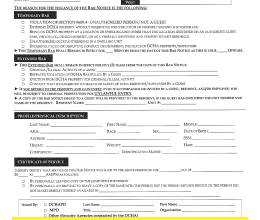
WASHINGTON – After negotiations with the ACLU of the District of Columbia, the D.C. Housing Authority has amended its standard barring notice to inform recipients about how they can challenge the bar or request that it be lifted temporarily. DCHA routinely issues these notices, which ban individuals from DCHA properties for periods of up to five years.
The ACLU-DC represented Schyla Pondexter-Moore, a former community housing activist who was served on October 7, 2016, with a 60-day bar notice from all DCHA public meetings after she was ejected from a September DCHA board meeting following her vociferous objection to the approval of a $13 million “predevelopment fund” for the Barry Farm housing complex.
“I’m deeply engaged in issues of housing justice, but when I was unconstitutionally barred from DCHA’s Board meetings, I wasn’t aware that I could challenge that decision,” said Pondexter-Moore. “I’m glad DCHA’s barring notice has been changed so now anyone who gets barred will know about their right to challenge the bar or to ask for it to be temporarily lifted.”
On November 3, the ACLU-DC sent a letter to D.C. Attorney General Karl Racine and Housing Authority Police Chief Joel Maupin denouncing Pondexter-Moore’s barring as unconstitutional and demanding that it be rescinded, arguing that it violated her First Amendment rights and her right to due process because it was issued without prior notice or opportunity to be heard. The Housing Authority lifted the bar the following day so Pondexter-Moore could attend a DCHA meeting on November 9.
In December 2016, the ACLU-DC sent a follow-up letter to DCHA General Counsel Ken Slaughter seeking policy changes to resolve all of Pondexter-Moore’s remaining claims arising from the October bar. After several months of negotiations, DCHA agreed to amend its barring notice to inform barred individuals of their rights. Specifically, DCHA residents may file a grievance challenging a bar imposed on a person they wish to invite onto the property as a guest, and anyone, including the barred individual, can request a bar to be temporarily lifted. DCHA also agreed to publish the news about the updated form and the due process rights available to barred individuals in its monthly newsletter.
“You can’t exercise a right unless you know you have one,” said ACLU-DC attorney Shana Knizhnik. “With this settlement, Ms. Pondexter-Moore has sought to ensure that all individuals served with DCHA barring notices are aware of, and able to exercise, their rights.”
To learn more about this case, go to: https://www.acludc.org/en/cases/pondexter-moore-schyla